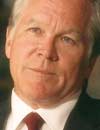- Carl Bernstein
Reporter - Ben Bradlee
Former editor, The Washington Post - Mark Feldstein
Professor, The George Washington University - James Goodale
First Amendment attorney - John Miller
Assistant director for public affairs, FBI - Bill Keller
Editor, The New York Times - Eric Lichtblau
Reporter, The New York Times - Norm Pearlstine
Former editor in chief, Time Inc. - Walter Pincus
Reporter, The Washington Post - Dana Priest
Reporter, The Washington Post - Tom Rosenstiel
Director, Project for Excellence in Journalism
What is important here, though, was a failure of [special prosecutor Patrick] Fitzgerald to understand how reporters and officials in Washington deal with each other, which is to say, they have conversations, and it is understood that those conversations are on background, that there is a protective device in place -- sometimes it has to be specifically reiterated; sometimes it does not -- and that this is the way information is obtained in Washington. And not just in Washington, [but] in state legislatures, in city halls all over America, in baseball clubhouses.
[Tell me about the role of confidential sources in Washington reporting.]
Well, a confidential source is somebody who will talk to you. ... You've got to get to the people who know; that's the culture of this town. I mean, half of the people are throwing it at you and want you to know everything that puts them in a good light, and the other half don't want you to know everything about a story because you might reach a different conclusion, and they might not look quite as good as they think they do. ...
... Do you think that confidential sources are overused? ... When I call an official in Washington, very often they'll say, "Now, this is off the record," and they start talking before I can say stop. It's like in Washington, D.C., everything is off the record unless the source says it's on the record.
Well, that makes life easier for them. But when they say that to you, you say, "Well, wait a minute; I don't want to take it if it's off the record." It's a lot easier for them to say that; then they don't have to worry about it. ...
When you're talking to a reporter at The Washington Post, and he says, "Should I grant this person confidentiality or not?," what's the guideline? What's the Bradlee rule?
If you're going to have a meeting over it, it's too late. You should try to get it on the record. Try for maximum identification. Keep it up, keep it up. After they say, "Well, I can't do it; I have to take it off the record," [you say,] "Well, why do you have to take it off the record?" And then maybe you say, "OK, I agree not to talk about this thing." ...
So the issue gets framed, though, around Watergate because the confidential source is so key to the story coming out.
Well, you're talking about Deep Throat? Well, he was key. But he was really key on keeping [Bob] Woodward and [Carl] Bernstein on track. He would call and would tell Woodward and Bernstein: "Don't bother with that. Just don't bother. That's going nowhere. You'll waste your time if you spend a lot of time on that. Take a look at the money. Watch the money. That's interesting." Often Deep Throat wasn't saying that if you go down this street 150 feet and turn right there's a little something under a rock; there's some information. That isn't the kind of detail that he was giving them.
So he was a guide?
He was a hell of a guide.
And so when you see this battle in 1972, '73, that's when it's really hot, right? That's also when Branzburg [v. Hayes], the decision comes down that you don't have, under federal law at least, a right to withhold your sources. Was that a threat or in some way a cautionary thing?
Sure, it was a cautionary thing, but it never was accepted by the press that we had to reveal our sources. The first thing that we started instructing our reporters [to do was] to go for maximum identification. Don't say there's "someone at the Pentagon;" that just baits everybody. There are 10,000 people in the Pentagon: male, female, Army, Navy, young, old, veteran. There are hundreds of ways of narrowing it down, even though you don't get the actual identification. ... You don't want to identify him so that he'll get in trouble. I don't think it's as complicated as society sometimes wants to make it.
There are people who are always up in arms against the confidential sources, but the people who are the confidential sources, they're not yelling. ... You don't hear Karl Rove talking about the abuse of confidential sources, because he's one of them. All those government people are. Presidents are. Presidents tell reporters things they wouldn't say at a press conference. ... It's the people who are in the dark. The people who don't know the source complain. ...
But doesn't this sort of laissez-faire attitude about confidential sources open you up to manipulation?
Of course, of course. People talk to reporters only because they want to, and the only reason they want to is they have a motive of some kind. It's up to a good reporter to understand what that motive is. Once you understand their motive, you can put it into perspective and give it the importance it's due. That's an essential part of journalism. But I don't think it's being greatly abused. The press corps is sophisticated. [They don't] just go in and start quoting people willy-nilly without putting it in a perspective. I don't think there are very many of them. ...
You can tell who the sources are. Really you can. If you suddenly see a story that is really dumping on some department or some person at a department, it's fairly well known in his little community who the people [are] who don't like him and want to get him. So you poke around, and you could say, "Oh, I wonder if it was Joe," or whatever, like that.
If you're going to start criminalizing those kind of leaks, which is what the nation's capital is based on, you're going to be throwing an awful lot of reporters in jail, and maybe an awful lot of government officials. Leaks are as old as the republic itself. George Washington was upset because some of his classified treaties and secret documents were leaked to the papers -- and P.S., Thomas Jefferson, his secretary of state, is the number one suspect. James K. Polk was all upset about secret treaties and Cabinet minutes, meetings [that] were leaked to the press -- and it was, P.S., his secretary of state, James Buchanan, who was widely regarded as the number one suspect.
Leaks are the way the world works. Leaks are the way Washington runs, and there's a reason for that. It's a kind of unofficial back channel for putting out trial balloons, for trying to influence policy behind the scenes, and then there's nothing terribly nefarious about it. It's a healthy mechanism in a democracy, and if you start trying to clamp down on that, if you start throwing reporters in jail for that, you're going to restrict the debate and really have bad consequences for democracy. That's my opinion.
[Prosecution using the Espionage Act is] the first step in creating total executive control over our activities, ... a unitary executive who has total control over the information. The reason that we've never had that in this country is because the only way we can be informed about international affairs, particularly where classification comes in, is if, frankly, there is leaking ... to reporters who understand what a leak is and how to put the information together. …
Let's take the example of Max Frankel. Max Frankel became the executive editor of The New York Times. He's a famous journalist. Before he became the editor of The New York Times, he was a foreign affairs reporter for The New York Times in Washington. Max Frankel put an affidavit -- that's a sworn statement -- in the Pentagon Papers case, which is an absolute, classic explanation of why classified information and the leaking of it is essential for the functioning of government. You cannot have an informed press without leaking classified information to them. You need the press sometimes to explain and express a governmental position, because if you do it yourself as a member of the government, you may not be believed. But in the context that a journalist can put to those very same statements, which are classified, the journalist becomes believable. It helps government policy to have leaks.
Now, try to explain what I've just said to the average man on the street, and they'll think you're a Communist and a traitor and everything else. Try to explain it to Max Frankel's lawyers in the Pentagon Papers case. They couldn't believe him, and he got so angry at them when he explained to them what I've just explained to you, he said, "I'm going home, and I'm going to write this explanation for you." ... [His lawyer] read it, and he was convinced. ...
Are you surprised by how much leaking goes on at the FBI?
I'm not surprised by how much leaking goes on anywhere in Washington. This is part of the Washington culture, which is people work the phones all day. I used to do this myself. You find people who, for various different reasons, will either tell you more than the next person did or, in some cases, more than they should.
I just imagine you in a meeting where one of your colleagues at the FBI turns to you and says, "John, how do we stop this?"
That's a question as old as ink. Since the first newspaper, since the first guy carved some letter into stone, people have been leaking. Before there was somebody carving it into stone, it was just called gossip. But it's not a new phenomenon, nor is it one that I think we're going to make go away with any law or any judicial solution. It's just the nature of the beast. The question comes down to those critical things that are going to affect public safety or the public good that are classified, and classified for a good reason. Can those things be held in? That's a bit of a struggle.
They haven't officially contacted us yet at all. As of today, as we sit there, we have not heard a word from the administration. ... It is part of the ritual in Washington that governments keep secrets, but they also use secrets as a kind of currency. Presidents classify information and then leak it selectively when it serves their purpose: to intimidate an enemy power; to help get an appropriation bill passed; even occasionally to discredit a political opponent. ...
So there is this kind of dance that goes on in Washington, and some of that was evident, I thought, in the SWIFT banking monitoring story. [Treasury] Secretary Snow, who denounced that story, ... three years earlier that same Secretary Snow had taken a group of reporters, including one of ours, around mostly the Middle East for six days to show off how impressive the government's operation was in monitoring international financial transactions, because at the time they wanted us to write about how relentless they were being in the attempt to cut off the flow of money to terrorist activities. ...
So one man's security breach is another man's PR campaign, and sometimes it's the same man. ... If it's hypocrisy, it's a hypocrisy that has actually served the country pretty well over the years. ... The ambiguity is the lubricant that allows the relationship between the government and the press to function. If the government tried to be absolute on the matter of leaking of secret information, there would be very little public understanding of what the government is up to. ...
Certainly there's been a bit of a slope that we've gone down in expanding the definition of what is a crime when it comes to classified information. The AIPAC [American Israel Public Affairs Committee] case has been a real test case that has worried a lot of people who think that it's effectively going down the road of criminalizing any discussion about matters that could conceivably be considered classified or sensitive. Those are discussions that go on every day in Washington, not just between reporters and sources but between lobbyists and lawmakers, lawmakers and lawmakers, executive branch and legislative branch. If you start criminalizing that, you really change the whole nature of public discourse in Washington.
In my own mind, from the outset, the story of Valerie Plame was really an example of day-to-day business as usual in Washington, the kind of interactions between journalists and government officials that have been going on for decades.
I was frankly surprised that there was so much demand for a special counsel to investigate. I was surprised when a special counsel was named and did not really see any evidence that any law had been broken in those conversations. And I was surprised when we got a subpoena. So all of this has been quite novel to me.
Surprised because you just thought this was the way things go and this is how you report in Washington?
Well first off -- not only in Washington. Leaks and use of anonymous sources is very much in the fabric of American journalism today. The places where it's most obvious are in Washington and Hollywood, on Wall Street and in sports.
And Washington probably leads the pack, because we've gotten to the point now where officials at agencies or within the White House are really reluctant to say anything on the record and are always asking for anonymity. So the conversations that Matt Cooper was having with whomever about Valerie Plame's identity did not strike me as out of the ordinary.
To be honest, I think every president, almost anybody in government worries about the press and tries to figure out a way to manipulate, close out people they don't like. In this current situation in the Plame case, if you read what Fitzgerald has said, there was a group in the White House that decided to go after Wilson.
Well, the president told the vice president who told his people and so forth: "Declassify things. Do whatever you can to turn this story around."
And within that -- I've written about it -- within that period after Joe Wilson's column in the Times and his interview in the Post, which got buried in the back of the paper, it is clear that at least four of us were talked to in the same way, in roughly the same story: The wife arranged for the trip -- to undermine the trip. That doesn't happen ad hoc. And you've seen sort of the outlines of it from Cheney to Libby to the reporters, Libby meeting with people to talk about it. So I think there was, as Fitzgerald said, a plan to do that.
A conspiracy to manipulate the press?
Or, as I put it, it's damage control. They're not the first administration to do it. I think every administration does it. They just did it in a way that came across or seemed to cut across laws. I don't think they violated the law. But they gave an opening to people to make that allegation.
And given the rules in Washington and the way confidentiality works, someone can do that, attempt to discredit somebody, and you'll grant them confidentiality.
In this case, my source had confidentiality and I didn't write about it, because I didn't think the information was correct. I still don't. I only wrote about it months later when there was a criminal investigation and I thought the public ought to know that I didn't think this was a crime. ...
In Washington, people have lots of off-the-record or confidential conversations all the time on all kinds of things, not just secret prisons.
Right. I think the press is guilty of allowing sources to ask for anonymity in far too many places.
To getting spun, you mean, by the sources?
Even if the information is not spun, but they just don't want their names attached to it. You have spokesmen who are paid by U.S. taxpayers to be the spokesmen for their agencies, and they won't put their name on simple statements. That's in part because we're not calling them on it enough, and I think that we should.
Papers and networks are not good at working together, but I would absolutely support an effort by us collectively to say, if you're a spokesman, you have to have your name on the record. We need to crack down on the use of anonymous sources when it's not absolutely necessary.
And now you're going to ask me when is it actually necessary. It is all a judgment call, but it has gotten overused, absolutely.
Out of control?
It's gotten out of control. USA Today stopped using them, and they were successful. They got people to be on the record with things that they initially said they wanted to be on background and not quoted. So I think we should do a better job trying to get people to be on the record.
Washington journalism has always operated, and continues to operate, even in the age of the Internet and the age of cable news and instantaneous communication, with very high-powered, top aides to the president talking in salons and in restaurants and in private conversation with elite journalists.
That situation, which existed even in colonial days, continues to exist. It's as old as journalism. Why? Because that's the powerful trying to get their message out to other elites, through elite media. And that's what occurred in the Plame case. It's what occurred in Watergate. It's what occurred during the Nixon administration, the Kennedy administration, the Roosevelt administration, the first Roosevelt administration, the Lincoln administration.
The lessons there are simply that, in an age of media scrutiny, the journalists have to be more careful about whose interests they're serving. Are they really having these conversations on behalf of the public, or are they having these conversations on behalf of themselves? Whose allegiance are they serving? There is more transparency now about these elite conversations than there's ever been. We're going to know more about them. There's going to be more scrutiny of them. Bloggers are going to start wondering about, "What was going through your mind as you were interviewing that Cabinet secretary?" …
![News War [site home page]](../art/p_title.gif)


















